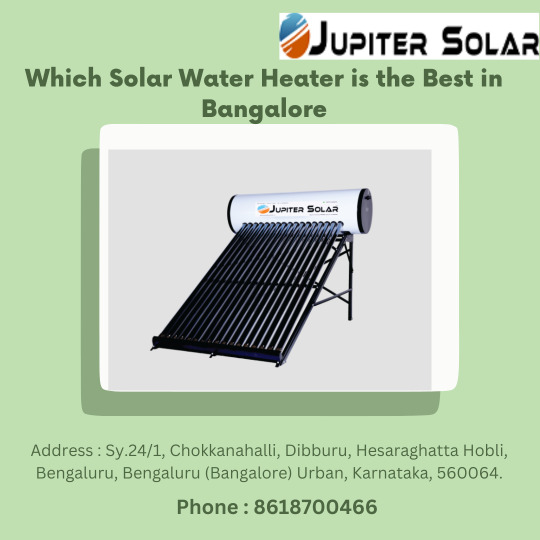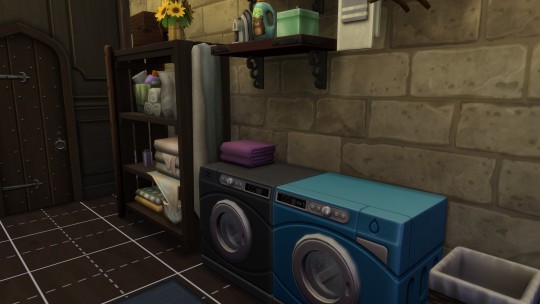#which solar water heater is the best
Explore tagged Tumblr posts
Text
Which Solar Water Heater is the Best in Bangalore?
Which Solar Water Heater is the Best in Bangalore?
Discover the best solar water heater in Bangalore and make an informed choice for your home. Find expert insights, tips, and FAQs about solar water heaters to help you decide. Which solar water heater is the best bangalore ?,Jupiter Solar,www.jupitersolars.in is one of the best solar water heater .
Introduction: Embracing Solar Energy in Bangalore
Welcome to the comprehensive guide on finding the best solar water heater in Bangalore. As the demand for renewable energy sources grows, solar water heaters have become a popular choice among eco-conscious homeowners in Bangalore. With abundant sunlight throughout the year, Bangalore offers the perfect setting for harnessing solar energy to meet your hot water needs.
In this article, we'll explore the key factors to consider when selecting a solar water heater, review some top options available in Bangalore, and provide answers to frequently asked questions to assist you in making an informed decision. Let's dive in and find out which solar water heater is the best for your specific requirements!
Understanding Solar Water Heaters
Before we delve into the specifics of the best solar water heaters in Bangalore, let's first understand how solar water heaters work and the different types available.
How do Solar Water Heaters Work?
Solar water heaters utilize sunlight to heat water for various domestic purposes. They consist of solar collectors, usually installed on rooftops, that absorb sunlight and convert it into heat. This heat is then transferred to a storage tank filled with water through a circulating pump or natural convection, ensuring a steady supply of hot water.

Types of Solar Water Heaters
Active Solar Water Heaters: These systems use electric pumps or controls to circulate water through the solar collectors and into the storage tank. They are ideal for regions with colder climates like Bangalore during winters.
Passive Solar Water Heaters: These systems rely on natural circulation and gravity to move water between the solar collectors and storage tank. They are simpler in design and well-suited for regions with milder climates.
Factors to Consider when Choosing a Solar Water Heater
Selecting the best solar water heater for your home requires careful consideration of several crucial factors.
Solar Insolation in Bangalore
Before installing a solar water heater, it's essential to assess the solar insolation, which indicates the amount of solar radiation received in a specific area. Bangalore enjoys high solar insolation throughout the year, making it an excellent location for solar water heating systems.
Storage Capacity
The storage capacity of a solar water heater depends on the number of occupants in your home and the daily hot water consumption. Consider a larger storage tank if you have a large family to ensure an uninterrupted supply of hot water.
Type of Solar Collector
Choosing the right type of solar collector is crucial for efficient water heating. Flat plate collectors are cost-effective and suitable for moderate climate conditions in Bangalore, while evacuated tube collectors perform better in colder climates.
Budget and ROI
Evaluate your budget and calculate the return on investment (ROI) for different solar water heater models. While initial installation costs may vary, remember that solar water heaters offer long-term savings on electricity bills.
Warranty and After-Sales Support
Ensure that the solar water heater you choose comes with a comprehensive warranty and reliable after-sales support. This ensures peace of mind and hassle-free maintenance.
Top Solar Water Heaters in Bangalore
Let's explore some of the top solar water heaters available in Bangalore based on customer reviews, energy efficiency, and performance.
Jupiter Solar Water Heater
Jupiter Solar Water Heater, www.jupitersolars.in is known for its cutting-edge technology and high-performance solar water heaters. With a variety of models to choose from, their products cater to different household sizes and hot water demands.
Solar Geyser
Solar Geyser offers an eco-friendly and cost-effective solution for your hot water needs. Their systems are designed to withstand Bangalore's climatic conditions and provide reliable performance.
Solar Water Heating System
Solar Water Heating System provides innovative solar water heating solutions, integrating advanced features for maximum efficiency. Their Solar heater products are known for their durability and low maintenance.
Best Solar Heater
Solar Heater combines efficiency, affordability, and durability. It's an excellent choice for budget-conscious homeowners without compromising on performance.
Are solar water heaters suitable for all weather conditions in Bangalore?
Yes, solar water heaters are suitable for Bangalore's weather conditions as they can effectively harness solar energy even during cloudy days.
Can I install a solar water heater on my own?
It is recommended to hire a professional installer to ensure the proper and safe installation of your solar water heater.
How long does it take to recover the initial investment in a solar water heater?
The payback period for a solar water heater in Bangalore typically ranges from 3 to 6 years, depending on your hot water consumption and the model chosen.
Do solar water heaters require regular maintenance?
Yes, regular maintenance is essential to ensure the optimal performance and longevity of your solar water heater.
Can a solar water heater be integrated with an existing electric geyser?
Yes, solar water heaters can be integrated with existing electric geysers to complement each other and ensure a continuous supply of hot water.
What should I do in case of low solar insolation for an extended period?
During periods of low solar insolation, an electric backup in the solar water heater can ensure an uninterrupted supply of hot water.
Conclusion
Choosing the best solar water heater in Bangalore requires considering factors like solar insolation, storage capacity, type of solar collector, budget, and after-sales support. Remember that solar water heaters are a sustainable and cost-effective solution that benefits both the environment and your household finances.
We hope this comprehensive guide has provided valuable insights to help you make an informed decision about the best solar water heater for your home in Bangalore. Embrace solar energy and contribute to a greener future while enjoying the luxury of hot water throughout the year.
Remember, before making a final decision, research and compare different models and brands to find the perfect fit for your needs.
#solar#solar energy#What should I do in case of low solar insolation for an extended period?#Can a solar water heater be integrated with an existing electric geyser?#Do solar water heaters require regular maintenance?#solar heater#solar water heater#solar heaters#Solar Water Heater Buying Guide#Bangalore#bengaluru#solar hot water system#How long does it take to recover the initial investment in a solar water heater#Best Solar Heater#Top Solar Water Heaters in Bangalore#Type of Solar Collector#Types of Solar Water Heaters#Which Solar Water Heater is the Best in Bangalore#heater#hot water#india#solar water heater bangalore
1 note
·
View note
Text
Sims au: Old Helex, Castle Heights, Old Dreadnaught Castle| Overlord

Brought to you by popular demand we are now featuring a tour of the infamous, Dreadnaught Castle! This castle has gone by many names over the centuries and certainly has a reputation of a sort but it's current owner has certainly done quite a deal to turn this crumbling old fortress into a magnificent mansion! Now this tour may take us awhile ( a reblog or two) due to its sheer size, but don't let that deter you! This masterpiece is worth the long walk! Should you survive ....



Rather than a street view look we'll start this tour with an aerial shot of this sprawling estate. From it's magnificent front towers to it's beautiful gardens and lovely private pool this mansion features of plenty modern touches to bring the crumbling relic up to our contemporary standards. With solar panels galore, on-site farming, rain capture water heaters, and natural springs this space does it's best to erase whatever carbon footprint it might take to keep this place up and running. And the incredibly manicured gardens surely- wait...do those trees look...phallic to anyone else?




*ahem* Yes, well, phalic nature of the tree-lined exterior approach aside, the gardens are excellently maintained and offer lovely moments of picturesque splendor in this quaint countryside. And what a front walk this makes for! With a romantic fountain, iron lampposts, and an expansive patio with elegant architecture this space certainly holds to higher standard of elegance and atmosphere.




Continuing our tour of the grounds, we'll be starting with the southern garden path. This lovely pathway beckons us in with a fantastical archway and leads down an ancient but lovingly restored path to the Castle's growing fields. While not terribly expansive this section of the grounds do offer horribly fertile ground to grow grapes for the ground's famous in-house wine. I'm told that most of the manor's food needs can also be supplemented from these fields and offer a lovely tableau for the grilling and picnicking area adjacent to the fields. This outdoor rest area looks out perfectly over the estate's expansive pond, which we will happily explore next!




This large pond can be easily accessed via the posterior entrance to the estate grounds as well as from the Castle directly. The Castle entrance here leads from the ground-floor laundry and storage area directly onto this waterway and it's lovely collection of flora and fauna. With romantic archways and grottoes reserved for enjoying the beauty of nature one can hardly blame Overlord, the current owner, from doing his best to stock the pond with local wildlife. Why there's a lovely pair of swans who- Is that an Alligator? No not the log, the thing next to the log. I saw it move! I did! Right there! I- ugh... okay fine. Let's move on to finish the tour of the grounds.





This long back walk opens toward the road leading to the estate and back out to the road, allowing access to staff and guests alike from the rear should they not wish to traverse the long drive to the front entrance of the estate. Though, I'm told it's bad manners to approach the estate in this manner. The walk is lined with lovely memorials to beloved pets who once walked these grounds and opens up to the west side of the grounds which feature a historical graveyard that has largely been overtaken by native plant growth, now cut back and cultivated to reveal more of the old facade. How odd though that some of those graves seem freshly dug. Also why is there a giant bonfire located near the gravesite? Hm. Yes well, moving on. The West end of the grounds also feature some ruins from the old castle which have been left intact for posterity but removed from the castle proper due to their crumbling nature and state of disrepair. And with the grounds wrapped up, let's head on inside for the rest of the tour!


We enter on the ground floor into the lovely foyer which features many of the estates modernized furniture while also highlighting the eras that have come before. Particularly the nineteen twenties which saw quite a bit of activity for the Castle! With lovely art deco revival pieces and stately vintage furniture to highlight updated facades and restored architecture, this foyer feels grand and welcoming. The water feature in particular is quite lovely and an amazing statement piece! Huh, that vase...is that really an urn? Hm. I'm sure I must just be mistaking it for a funeral urn, that's all. Shall we move on?

Heading into the hallway on the right we've entered into a stately passageway that features some lovely modern art pieces as well as a bit of industrial storage while still providing access to the safety measures included in the castle to protect the owner's vast investment into this home.



Heading into the door on the right and we've entered into the ground floor office space. This cozy den has plenty of charm and really highlights the use of industrial, art deco, and luxury inspired pieces to create a cohesive and good-looking environment. The office's private bathroom also features lovely tile work that manages to avoid feeling cramped thanks to the vaulted ceilings and large mirror. Just around the corner from the couch is the first set of stairs on the east end of the castle, which will eventually become the east tower. Ah and I see we've included a few antique taxidermy pieces. What a...lovely vulture skull. Oh and a preserved cow-plant! How...unsettling beautiful. Erm, let's just head on out shall we?


We'll head next into the door at the end of the hall which leads us into the ground-floor laundry which has access to both the exterior grounds as well as the pool deck and patio space! The laundry itself is serviceable and feels charming with much of the original stonework and infrastructure remaining intact. And with this room we'll go ahead and take a break before returning to our impressive tour!
13 notes
·
View notes
Text
Hot water heaters
According to the US Department of Energy, water heating accounts for about 20% of the energy use in your home. There are many things that you can do to reduce the amount of hot water you use, but maintaining your water heater is also very important for saving energy. There are many types of water heaters: demand or tankless, solar, and storage, to name a few. A single-family storage water heater offers a ready reservoir -- from 20 to 80 gallons -- of hot water. In the US, these storage water heaters are in wide use, although the tankless and solar water heaters are becoming more popular. If you are selecting a new water heater, do some research on the various types to see which is best for you. If you have an existing storage water heater, proper maintenance will help it perform more efficiently and last longer, both important in saving energy. I found good how-to resources for storage and tankless water heater maintenance. Also check the temperature setting for your hot water heater. Most information sources recommend 120 degrees Fahrenheit so that the water is hot enough for most uses but uses less energy than higher temperature settings. Temperature settings below 120 degrees Fahrenheit are not recommended for safety reasons.
17 notes
·
View notes
Text
Neo-Atlantis Codex: Part III: Grid Storage
So, you want to use some unstable form of power. Wind and Solar are the biggest ones, but we could also add tidal and microhydro to the list.
Currently, 95% of grid power storage, world wide, is pumped hydro. This is in theorygood, as it does work. The problem is that regions that can use pumped hydro will typically have geography to use regular hydro, which is very, very, very efficient. But you can add pumped hydro to an existing system.
For home power storage, we use chemical cells. Typically Lithium. By current estimates, we do not have enough lithium and cobalt in the world to replace our cars, nevermind the entire grid. A lot of the mining is also done by child slaves in Africa. They also use water leeching, which works. but also uses a LOT of fresh water. It's often done in deserts, in which fresh water is the most precious thing you can have.
Lithium is also EXTREMELY flammable.
What about other chemicals? Well, we can make chemical cells out of salt water and iron. This used to require a pump, and which made it hard to miniaturize. Anything mechanical is also prone to mechanical breakdown. They have recently developed technology to elimitate the use of pumps. It's still not good for grid storage, but would be good for home power storage. It might make sense to move to a paradigm that the state provides power when it can, and homes had to store their own power. This would work, although it would require a complete change of our paradigm, and would be expensive for the poor. Which is the problem for anything to do with power, as any increase in energy cost punishes the poor, and will drop people into poverty. It will also kill off the vulnerable.
Earth Batteries. You take something with a high durability and heat capacity, like earth, stone, brick, etc. You put it inside an insulated shell. You have a heater inside. Power added from the outside becomes heat inside. The heat can be kept for a week without too much loss. You can either use this directly for heat, or use it to heat water into steam. Doing so would allow it to produce electricity. This is suitable for neighbourhoods or industrial applications. The problem with a steam engine is that you would likely need a steam engineer, which are expensive. It would also require individual neighbourhoods to be self-governing villages/shires, which would help with so many other problems. We'll talk about this later in Neo-Atlantis government/electoral system. This would reduce the work required from other parts of the power system, and in theory, in some areas, these neighbourhoods/villages/shires/wards could be entirely self-generating. If California could shed it's horrifying Fascist control, it has more than enough sunlight that individual neighbourhoods could be self-generating if it could store the power. This would also prevent blackouts. Everytime I look back, it gets further way, but in 2003, the entire Eastern side of Canada, and the New England had a power outage. Because of how connected the grids are. Independent neighbourhood production would completely eliminated this. If you had a tree down over the power lines, it would hurt at most, one neighbourhood.
Compressed air storage. The best usage of this is, funny enough, CO2. You have a giant balloon, kind of an expanding membrane. You hook it up to a pump and a turbine and heat exchanger. Power causes the pump to pump the CO2 from the balloon into the tank. You release CO2 from the tank through the turbine, and it produces power. The big drawback for this is that it requires a lot of space. Which makes it perfect for isolated solar / wind power plants. This also requires nothing in the way of novel technology, and is perfect for large grid storage.
Hydrogen. Contrary to expectations, hydrogen fuel cells never went away. Both Toyota and Hyundai have production Hydrogen fuel cell cars. Hydrogen combustion cars are also perfectly viable, if not currently commencial. Hydrogen can be produced from water through electrolysis, though not efficiently so. It can be produced mechanically from natural gas / methane; the mechanical converters use a portion of the power they produce to power themselves. Before the government were... what?.. afraid the fuel cells might actualy work? I'm old enough to remember the promise of a Hydrogen Highway from California to British Columbia to allow you to drive hydrogen fuel cell cars up and down the coast. Well, they forgot about that. Before this happened, there was a research group that made it with algae in glass tubes. All you needed to do was pump water through them. People in California could probably add it to a closed system in their car.
Synthetic Fuel. Synthetic fuel has been used, in a small scale, in racing for years. Formula 1 is also planning to replace it's entire usage with synthetic fuel in the future, apparently from atmospheric carbon dioxide and wind power. This would have the advantage of requiring no time or money to implement. It would use our existing fuel infrastructure, while also allowing the small producers to be created everywhere.
2 notes
·
View notes
Text
Commercial Solar Panels – Why Choose Commercial Solar Panels in Lake Macquarie?

Lake Macquarie residents & businesses are prioritising saving dollars & the environment with solar. On average, a residential solar system in the 2280 postcode area produces over 25kW a day, with surplus power fed back into the grid for a generous 5c per kilowatt-hour feed in tariff.
A commercial solar system can efficiently generate both electricity & hot water during peak hours, drastically reducing your business’s energy costs. It also offsets greenhouse gas emissions.
Generating Electricity
If you live in Lake Macquarie, it’s a great place to install solar panels because it gets excellent sun irradiation. We can provide you with a range of solar energy solutions, from solar hot water systems through to power systems and battery storage.
Our experienced team can help you find the right solution for your home or business. We can help you compare the benefits of different products to determine which will best suit your needs. We can also help you secure finance to pay for your new solar system, if required.
Solar panels generate electricity and provide you with alternative green power, significantly reducing your power bills and carbon emissions. You can even sell excess electricity back to your energy retailer via a feed in tariff, potentially generating a profit.
In NSW, you usually need to apply for Council approval to install Solar Panels. This is because they are an alteration to your property and may impact its appearance, structural stability or fire safety requirements.
Generating Hot Water
Using the sun’s free energy to produce hot water reduces the load on your electricity system and lowers your power bills. You’ll also be helping to reduce greenhouse gas emissions. Solar hot water systems can be standalone or packaged with a conventional storage or tankless water heater for backup on cloudy days and when demand is high.
Solar hot water systems use flat plate collectors, evacuated tubes or a thermosyphon system to collect the heat from the sun and convert it into domestic hot water (DHW). They are also available with a gas back-up for cloudy days.
Eligible house-owners can get a rebate from the NSW government through the Small-Scale Renewable Energy Scheme (SRES) and receive discounted energy products such as a top-of-the-range solar water heater or home battery. Interested people should contact approved suppliers to scrutinize their needs and organize several financial quotations. They can also opt for solar leasing, a flexible financing option that allows them to enjoy the benefits of a solar energy system with no upfront payment required.
Reduced Power Bills
Solar energy systems are an efficient means of producing electricity on-site and lowering commercial energy bills. This is because they reduce reliance on other energy providers, and hence the higher prices that come with them.
Furthermore, the free energy provided by the sun is a highly reliable power source. As such, a commercial solar system will produce more energy than required, which can be exported to the grid for a subsidised power bill or stored in a home battery.
Additionally, energy savings can be increased by implementing simple energy efficiency measures such as timers on equipment and installing efficient lighting, e.g. LEDs. In this way, a commercial solar system will begin to pay for itself through energy savings within a few years and continue saving businesses money every year thereafter. In addition, the use of renewable energy also reduces greenhouse gas emissions. This is a win for your business and the planet!
Sustainability
With the world’s attention focused on climate change and fossil fuel use, many people are now demanding businesses practice environmental responsibility. One of the easiest ways to do this is by switching to renewable energy sources like solar.
Commercial solar systems can help a business cut their electricity bills by generating their own power using the sun’s energy. This also minimizes their reliance on the main grid, which reduces overall power costs and carbon emissions.
As the most popular form of solar, photovoltaic (PV) panels produce clean energy that doesn’t contribute to greenhouse gas emissions or other forms of pollution. A commercial solar system can be used for both electricity and hot water, providing substantial savings on energy bills for businesses. These savings are even higher when a solar battery is included with your commercial solar system. These batteries store excess energy for later use when the sun is not out. They can also help with peak load management, reducing demand on the main grid and minimizing your power bills during these times.
youtube
source https://solarpanelslakemac.wordpress.com/2023/07/21/commercial-solar-panels-why-choose-commercial-solar-panels-in-lake-macquarie/
2 notes
·
View notes
Text

Astral CPVC PRO Piping System is compatible with both hot and cold water. It withstands very high temperature compared to any other thermoplastic plumbing systems. Many solar and electric water heaters have CPVC piping system for heat efficiency and lower installation cost. Corrosion resistance | Lower bacterial growth | Tough, rigid material | No Scale, pit or leach formation | Unaffected by chlorine in the water | Chemical resistance | Low thermal expansion | Easy, cold welding process | Superior insulation | Fire safety | Cost effective.
ASTRAL CPVC PRO pipes and fittings, manufactured by Astral Poly Technik Ltd., are made from the specialty plastic, chemically known as Chlorinated Poly Vinyl Chloride (CPVC). This CPVC compound shall meet cell class DP 110-2-3-2 as per IS 15778 and a maximum service temperature up to 93°C. This compound is carefully designed in our R & D and backed by our own expertise of manufacturing CPVC piping system from last 17 years, which will give excellent results in all applications for CPVC piping system. It is unique combination of highest impact resistance without any loss in pressure bearing capacity / Tensile strength or Vicat softening temperature. This will ensure best trouble free service and also stood notch above the initial installation issues of cracking / damages due to handling, storage and installation. Optimal Trading Ltd. Provider of best quality CPVC pipe & Fittings in Bangladesh
#Plumbing Pipe Dhaka#Astral Pipe Dhaka#Best CPVC Pipe#Astral Pipe#Plastic Pipe Dhaka#Update price list#CPVC Pipe price in Bangladesh#Astral pipe price#CPVC Pipe price
0 notes
Text
Find Trusted Local Tradies in Melbourne – Fast, Reliable & Affordable!

From Repairs to Renovations – Connecting You with the Best Tradies in Town!
When it comes to maintaining the functionality and safety of your home or business, having access to reliable and skilled Plumbers Melbourne is essential. As one of the largest and most diverse cities in Australia, Melbourne's plumbing needs are varied, from routine maintenance to emergency repairs and large-scale installation projects. Whether you're dealing with a leaking pipe, clogged drain, or planning a new home build, plumbers in Melbourne are the go-to professionals who ensure your plumbing system works efficiently and safely.
Why You Need a Professional Plumber in Melbourne
Plumbing is a complex and often overlooked aspect of home and business maintenance. However, problems with plumbing can lead to significant damage and costly repairs if not addressed properly. This is why hiring an experienced plumber in Melbourne is crucial for both minor repairs and major installations.
Melbourne’s diverse climate, which can experience both hot summers and cold winters, puts extra strain on plumbing systems. Burst pipes during winter or blocked drains after heavy rainfall can cause substantial damage to properties, making it important to have an expert plumber on hand who knows how to handle the specific challenges of Melbourne's weather conditions.
Whether you need help with routine plumbing tasks or are dealing with an emergency, professional plumbers are trained to address the issue quickly and efficiently. Attempting DIY plumbing repairs can often make matters worse, leading to more damage and higher costs in the long run.
Common Plumbing Services Offered by Melbourne Plumbers
Emergency Plumbing Repairs: Plumbing emergencies can strike at any time, and they often require immediate attention. From burst pipes and severe leaks to blocked toilets or overflowing drains, emergency Plumbers Melbourne are available 24/7 to provide rapid, reliable service. These professionals are well-equipped to handle urgent plumbing issues to prevent further damage to your property.
Leak Detection and Repairs: One of the most common plumbing issues in Melbourne homes and businesses is leaking pipes. These leaks, which often go unnoticed until significant damage occurs, can waste water and increase utility bills. Professional plumbers use advanced technology to detect leaks hidden in walls, floors, or underground pipes and carry out necessary repairs quickly.
Blocked Drains and Toilets: Blocked drains are a frequent issue in Melbourne, often caused by food debris, hair, grease, or other materials that clog the pipes. A professional plumber has the tools and expertise to clear blockages efficiently, restoring your drainage system. For toilet blockages, a plumber can also identify the cause and address the issue without causing further damage.
Hot Water System Installations and Repairs: Hot water systems are essential for comfort in both homes and businesses. Melbourne plumbers are experienced in installing, maintaining, and repairing various types of hot water systems, including electric, gas, and solar water heaters. If your system is malfunctioning or needs to be replaced, a licensed plumber can help you choose the best option for your needs.
Gas Fitting and Repairs: In addition to general plumbing services, many Melbourne Plumbers Melbourne are also licensed gas fitters. This means they can install and repair gas appliances like stoves, heaters, and hot water systems safely and in compliance with the relevant regulations. Gas plumbing issues can be hazardous, so it’s important to trust a professional who has the required skills and knowledge.
Renovation Plumbing: If you’re renovating your home or business, you’ll need expert plumbers to help with reconfiguring existing plumbing systems or installing new ones. Melbourne Plumbers Melbourne can work with you to ensure that your plumbing meets the needs of your new space, from adding new bathrooms to upgrading kitchen plumbing for better efficiency.
Why Choose a Local Melbourne Plumber?
Choosing a local plumber in Melbourne offers many advantages. Local plumbers have in-depth knowledge of the area, including common plumbing issues related to Melbourne’s climate and infrastructure. They are also familiar with local regulations and codes, ensuring your plumbing system complies with all necessary standards.
Additionally, working with a local plumber means you are supporting a community business. Melbourne's local plumbers are often dedicated to providing personalized and reliable service to their clients, as they understand that word-of-mouth referrals are crucial to their success. Local plumbers also tend to be more responsive and available, especially when urgent plumbing problems arise.
How to Find a Reliable Plumber in Melbourne
When looking for a reliable plumber in Melbourne, it’s important to do your research. Start by checking online reviews, asking for recommendations from friends or family, and ensuring the plumber you choose is licensed and insured. Reputable plumbers will also offer upfront pricing and provide free quotes so you can make an informed decision.
Make sure to choose a plumber who has experience with the specific type of plumbing issue you’re facing. Whether it’s a burst pipe, gas leak, or water heater installation, a skilled plumber will have the necessary knowledge and equipment to handle your project.
Final Thoughts on Plumbers Melbourne
Plumbing issues are an inevitable part of property ownership, but with the right professional plumber in Melbourne, you can ensure that your plumbing systems are always in top shape. From emergency repairs to routine maintenance and installations, Melbourne’s plumbers are equipped to handle a wide range of plumbing services. By hiring a trusted local plumber, you’ll benefit from expert knowledge, high-quality service, and peace of mind knowing that your plumbing is in safe hands.
0 notes
Text
Shop the Top-Rated Pool Heaters for Maximum Comfort!
When it comes to enjoying a luxurious swim in your pool year-round, the right pool heater is a game-changer. Whether you live in a region with cold winters or simply want to extend your swimming season, investing in the best pool heater can elevate your comfort and convenience. But with so many options available, how do you choose the top-rated pool heater for your needs? In this comprehensive guide, we’ll explore the various types of pool heaters, key features to look for, and why EvoHeat’s pool heaters are among the best in the industry.
Why You Need a Pool Heater
A pool heater is not just a luxury—it's a practical investment that allows you to enjoy your pool regardless of the season or outdoor weather conditions. Pool heaters make it possible to maintain a consistent and comfortable water temperature, ensuring you can swim comfortably no matter how chilly the weather is. Here are a few reasons why a pool heater is essential:
Year-Round Swimming: A pool heater allows you to enjoy your pool even when the temperature drops, giving you access to your pool all year long.
Consistent Water Temperature: If you prefer swimming in warm water, a heater helps maintain that perfect temperature.
Increased Property Value: Adding a pool heater enhances your pool's usability, which can increase your home’s appeal and value.
Better Comfort for Your Family: Whether it’s early morning laps or evening relaxation, a pool heater ensures your pool is always the ideal temperature.
Types of Pool Heaters
Not all pool heaters are created equal, and choosing the right one depends on your pool size, location, and energy efficiency preferences. Let’s break down the most common types of pool heaters available on the market:
1. Gas Pool Heaters
Gas pool heaters are among the fastest and most efficient ways to heat a pool. They use natural gas or propane to heat the water quickly and can maintain the desired temperature regardless of external conditions. Gas heaters are ideal for pools in areas with fluctuating weather or for those who want to heat their pool on-demand. However, they are typically more expensive to operate in the long run due to fuel costs.
2. Electric Pool Heaters
Electric pool heaters are a more energy-efficient choice than gas heaters and are often less expensive to install. They work by using electricity to heat the pool water through a heat exchanger. While they are slower than gas heaters, they are more energy-efficient, making them a popular choice for homeowners looking to save on energy costs.
3. Solar Pool Heaters
If you're environmentally conscious or live in a sunny region, a solar pool heater may be the perfect choice. Solar pool heaters use solar panels to capture the sun’s energy and heat the water. They are environmentally friendly and require very little maintenance, though they can be slow to heat the pool and are dependent on consistent sunlight.
4. Heat Pump Pool Heaters
Heat pump pool heaters are highly energy-efficient and can work in a variety of climates. They use the air to heat the water, transferring heat from the surrounding environment to the pool. They work best in mild to warm climates but can also function in cooler weather, although they may take longer to heat the pool in lower temperatures. Heat pumps are popular due to their low operating costs and energy efficiency.
Factors to Consider When Choosing a Pool Heater
Selecting the right pool heater for your needs involves more than just looking at price. Here are some important factors to keep in mind:
1. Pool Size and Type
The size of your pool plays a significant role in the type of heater you choose. Larger pools require more powerful heaters, and some heaters may not be capable of efficiently heating larger pools. It’s important to match the capacity of your heater with your pool’s requirements. Additionally, the type of pool (inground or above-ground) can also influence your choice.
2. Climate
Your local climate is a major factor in selecting a pool heater. If you live in a region with consistently warm weather, a solar or heat pump heater may be your best option. On the other hand, if your pool is located in a cooler climate, a gas heater or an electric pool heater may be more suitable for keeping the water at the desired temperature.
3. Energy Efficiency
Energy efficiency should be a top priority when choosing a pool heater. Pool heaters can consume a lot of energy, and choosing an efficient model can help reduce your operating costs over time. Heat pumps and solar heaters tend to be the most energy-efficient options, with lower ongoing costs compared to gas and electric heaters.
4. Installation and Maintenance
Some pool heaters are easier to install and maintain than others. Gas and electric heaters are typically straightforward to install but may require professional assistance. Solar heaters require a bit more setup, including installing the solar panels, while heat pump heaters usually offer a balance between ease of installation and energy efficiency.
EvoHeat Pool Heaters: A Cut Above the Rest
EvoHeat is a trusted name in the pool heating industry, known for producing high-quality, energy-efficient, and durable pool heaters. Their range of products is designed to provide maximum comfort, energy savings, and long-lasting performance, making them a popular choice among pool owners. Here are some reasons why EvoHeat’s pool heaters stand out:
1. Energy Efficiency
EvoHeat’s pool heaters are designed with energy efficiency in mind. Their heat pump models, in particular, are incredibly energy-efficient, offering lower operating costs while still providing optimal heating performance. EvoHeat’s pool heaters are perfect for homeowners looking to keep their energy bills low without sacrificing comfort.
2. Environmentally Friendly
As an environmentally-conscious company, EvoHeat prioritizes sustainability in their products. Their heat pumps, which use the surrounding air to heat your pool water, have minimal environmental impact. Choosing EvoHeat means you’re investing in a pool heater that helps reduce your carbon footprint while providing excellent performance.
3. Durability and Longevity
EvoHeat pool heaters are built to last. Made from high-quality materials, they are designed to withstand the rigors of outdoor use and provide reliable performance for years to come. With proper maintenance, EvoHeat heaters can last for a long time, offering you great value for your investment.
4. Advanced Technology
EvoHeat integrates advanced technology into their pool heaters, ensuring they perform at the highest level. With features like intelligent control systems, remote monitoring, and precise temperature control, EvoHeat’s heaters offer ultimate convenience and control.
Conclusion
Investing in a pool heater is one of the best ways to maximize the enjoyment and comfort of your pool. Whether you're looking to extend your swimming season, maintain a consistent water temperature, or reduce your energy costs, the right pool heater can make all the difference. EvoHeat’s top-rated pool heaters offer a combination of energy efficiency, durability, and advanced features, making them the ideal choice for pool owners looking for maximum comfort and performance.
Explore EvoHeat’s range of pool heaters today and find the perfect solution for your pool heating needs!
0 notes
Text
How Solar Water Heaters Perform in Colder Climates and Necessary Adaptations
Discover how solar water heaters function in cold climates and learn about essential adaptations to enhance efficiency and reliability.
How Solar Water Heaters Perform in Colder Climates and Necessary Adaptations
Solar water heaters are a fantastic investment for reducing energy bills and promoting sustainability. However, their efficiency can be affected by colder climates. Let’s dive into how they perform in low temperatures and the necessary adaptations to maximise their functionality.
Understanding Solar Water Heater Functionality
Solar water heaters capture sunlight through solar collectors to heat water. These systems work exceptionally well in sunny areas, but colder climates present challenges such as:
Reduced sunlight hours.
Freezing temperatures affecting water pipes and collectors.
Decreased efficiency in overcast weather.
How Solar Water Heaters Perform in Colder Climates and Necessary Adaptations
Challenges of Solar Water Heaters in Cold Climates
Heat Loss Heat loss is more significant in colder climates due to temperature differences between the water and the surrounding air.
Freezing Risk Pipes and collectors are prone to freezing, which can cause damage and disrupt water flow.
Insufficient Sunlight Overcast skies and shorter days limit the energy available for heating.
Call : +91 9364896193, +91 9364896194 to buy solar water heater
Necessary Adaptations for Colder Climates
Here’s how you can ensure optimal performance even in freezing conditions:
1. Use Anti-Freeze Systems
Closed-loop systems use a non-toxic anti-freeze solution that circulates through the collectors and prevents freezing.
2. Opt for Evacuated Tube Collectors
Evacuated tube collectors retain heat better than flat-plate systems, making them ideal for low-temperature areas.
3. Incorporate High-Quality Insulation
Properly insulate pipes, storage tanks, and collectors to minimise heat loss.
4. Install Backup Heating Systems
Complement solar systems with electric or gas-powered backup heaters for consistent hot water supply.
5. Tilt Collectors Correctly
Adjust the angle of solar collectors to maximise exposure to the winter sun.
6. Choose Freeze-Tolerant Components
Invest in components specifically designed to withstand freezing temperatures.
Benefits of Solar Water Heaters in Cold Climates
Even with challenges, solar water heaters offer several benefits in colder regions:
Energy Savings: Reduces reliance on fossil fuels and lowers energy bills.
Sustainability: Minimises carbon footprint by using renewable energy.
Longevity: Systems adapted for cold climates tend to last longer due to their robust construction.

Case Study: Solar Water Heater Success in Cold Regions
Countries like Canada and Norway have successfully implemented solar water heaters with the right adaptations. Homeowners report significant savings and minimal disruptions, proving that with proper planning, solar heaters thrive even in extreme climates.
1. Can solar water heaters work in freezing temperatures? Yes, with adaptations like anti-freeze systems and proper insulation, solar water heaters can work efficiently in freezing conditions.
2. What type of solar collector is best for cold climates? Evacuated tube collectors are highly efficient in retaining heat, making them the best choice for colder areas.
3. Do I need a backup heating system? A backup heating system ensures a consistent hot water supply during extended cloudy or freezing periods.
4. How do I prevent pipes from freezing? Use freeze-tolerant components and ensure all pipes are well-insulated.
5. Are solar water heaters cost-effective in cold climates? Yes, the initial investment pays off through reduced energy bills and long-term durability.
Conclusion
Solar water heaters are a sustainable solution, even in colder climates. With proper adaptations like anti-freeze systems, high-quality insulation, and the right solar collectors, you can enjoy consistent hot water year-round. Don’t let cold weather stop you from embracing renewable energy.
Ready to make the switch? Explore premium solar water heaters at Jupiter Solar and revolutionise your energy consumption today!
#solar#solar water heater#solar energy#bangalore#india#solar water heaters#solar water heating#bengaluru#solar heater#water#SolarWaterHeaters#ColdClimates#RenewableEnergy#Sustainability#EnergyEfficiency#GreenLiving#SolarEnergy#EcoFriendly#SolarHeaterAdaptations#WinterSolutions#HomeHeating#SustainableLiving#SolarPower#EcoTechnology#EnvironmentallyFriendly#CleanEnergy#SolarWaterHeating#ClimateAdaptation#EnergySavings#SolarSystems
2 notes
·
View notes
Text
The Smart Trick of heizung pool That No One is Discussing
My ultimate recommendation for how to warmth your pool would be to Prepare well. You gained’t do oneself any favors by placing your swimming pool in total shade. Even on the very hot working day, your pool h2o will be Significantly cooler if it doesn't get some daylight during the day. The Solar is your greatest free heating resource, so utilize it!
Although this solar blanket poses no basic safety threats, is easy to use, will never Use a detrimental impact on the pool filtration system and is also affordable, it will also feel to carry the bottom amount of effectiveness. These liquid photo voltaic blanket’s efficiency are impacted by wind pace for the floor from the pool as well as h2o features that crack the surface area from the pool generating pool surface area agitation.
Coiled copper pipe is put on an elevated rack inside the stove, and also the Wooden fire heats it up. As copper melts at 2000°File, and wood stoves range between one hundred ten° to 250°File, you’ll don't have any troubles When you've got problems concerning the coil melting.
Heat pumps remain perceived as a fresh principle to a lot of homeowners in the US and Canada and since they've improved noticeably in general performance over the years there are lots of…
If you want to warmth your pool as swiftly as feasible, you need to investigate setting up a propane or organic fuel heater. A fuel pool heater warms the pool drinking water as being the water is pumped in the filter.
With eleven+ a long time of encounter inside the pool marketplace, Rick is a specialist in fixing even probably the most sophisticated pool and scorching tub problems. He is aware a point or two about all aspects of pool maintenance but his superpower is drinking water chemistry.
Gasoline heaters tend to be the swiftest choice to warmth your pool, but they may have higher ongoing charges and so are not eco-welcoming.
But Thankfully, with the help of technological innovation, Now you can heat your pool h2o, so you're able to consider issues into your own hands in place of solely counting on the elements.
Working with gas heaters frequently will increase your energy bill exponentially. Based upon your region, all-natural fuel may be on the list of costlier utilities, so working it for hrs at a time will bring about a significant Invoice.
All Arctic Spa & Pool Heat Pumps are both heater together with chillers. On automated manner, the warmth heizung pool pump will preserve The best temperature by switching from heating to cooling as required. Great for scorching summertime climates where a refreshing pool is welcomed in the warmth waves.
A titanium heat exchanger making sure a protracted Functioning lifestyle. Arctic Spa Warmth Pumps use titanium to stand up to the severe natural environment of a spa or a pool which can consist of superior levels of chlorine, bromine, or salt.
A solar include or blanket is actually a big sheet of slim plastic you area with your pool drinking water when not in use, usually resembling bubble wrap. In addition they come in various shapes, dimensions, thickness, and colours.
We have been thoroughly amazed Along with the GeoBubble EnergyGuard photo voltaic pool cover. It surpassed our anticipations and it has garnered fairly the fascination via the pool company that helped us install it and our heater, along with the pool support human being. Given that putting in it about per month in the past, our pool temps have not dropped greatly overnight and the pool has needed less routine maintenance Over-all.
Numerous who may have thought of or used both of the above described blankets also take into account them being Ugly, challenging and/or pricey to use - and as we reported, encompassing ourselves with vinyl just isn't an excellent decision of material so polyethylene may be a better option (see right here). The last kind of blanket readily available out there is definitely the Liquid blanket, so we must always examine that.
0 notes
Text
Gas vs. Electric Water Heater Installation: Which One is Best for Your NJ Home?
Hot water is an everyday essential. From morning showers to clean dishes, your water heater tirelessly keeps your home comfortable. But when it's time for a water heater installation, the question arises—should you choose a gas or electric water heater? The answer depends on various factors, including energy efficiency, environmental impact, and cost, especially for homeowners in New Jersey.
This post will cover everything you need to know to make the best decision for your home, from energy savings to installation and maintenance considerations.

Energy Efficiency
When it comes to energy efficiency, both gas and electric water heaters offer unique benefits. But which one saves you more in New Jersey's energy landscape?
Electric Water Heaters: Electric water heaters are known for their high energy efficiency ratings. Nearly all the electricity used to power an electric heater is converted directly into heat, meaning minimal energy is wasted during operation. However, in New Jersey, electricity rates are higher than the national average, which could lead to higher operating costs over time despite the efficiency.
Gas Water Heaters: Gas water heaters heat water quickly and are more cost-effective for fuel. Natural gas tends to be more affordable in New Jersey, making gas models a popular choice for many households. However, gas heaters lose some energy as exhaust, reducing their overall efficiency compared to electric models.
Environmental Impact
Want to make a greener choice? Your decision between gas and electricity can also impact your home's carbon footprint.
Electric Water Heaters: Electric models are typically considered more eco-friendly because they don't produce direct greenhouse gas emissions. However, the environmental impact depends on how electricity is generated in your area. Fortunately, New Jersey has been steadily increasing its reliance on renewable energy sources like solar and wind, making an electric choice greener.
Gas Water Heaters: Gas heaters burn natural gas to heat water, which results in direct emissions. While newer models are more efficient, they still contribute to New Jersey's overall carbon footprint.
How to install a water heater and Maintenance
Ease of installation and ongoing Maintenance are crucial considerations when choosing the proper water heater installation for your home.
Gas Water Heater Installation and Maintenance: Installing a gas water heater in New Jersey often requires access to a natural gas line, which may be an added step (and cost) if your home doesn't already have access. Ventilation systems to expel exhaust gases are also mandatory. Maintenance often involves ensuring the gas supply is safe and leaks-free, plus regular checks on the burner and venting.
Electric Water Heater Installation and Maintenance: Electric water heaters are generally easier to install since they don't require ventilation or gas lines. They also need less ongoing Maintenance—regularly checking heating elements and clearing sediment buildup is typically enough.
Suitability for NJ Homes
Not all homes are the same, and what works for a Cape Cod-style home in Hoboken may not suit a ranch house in Cherry Hill. Here are some factors to consider for your New Jersey home:
Natural Gas Availability: A gas heater might be the more convenient and cost-effective choice if your home already has a gas line connection.
Space Constraints: Electric models don't require venting, making them better for tight spaces like apartments or homes with limited utility room layouts.
Backup Power Needs: Gas heaters can still function during a power outage, a big plus during New Jersey's stormy seasons.
Real-Life Example: A homeowner in Montclair might prefer a gas water heater due to ready access to natural gas and frequent power outages. Meanwhile, an eco-conscious homeowner in Princeton with limited space might choose a compact, green electric model.
Cost Analysis
Whether gas or electric is more budget-friendly depends on upfront costs, long-term expenses, and available incentives in New Jersey.
Upfront Costs: Electric water heaters typically cost less to purchase and install. While slightly more expensive up front, gas heaters offer lower operational costs for most New Jersey homes.
Long-Term Costs: Electric heaters incur higher running costs due to New Jersey's above-average electricity prices. Conversely, the affordability of natural gas in the state helps keep gas heater operating costs lower.
Rebates and Incentives: New Jersey promotes energy efficiency through various rebate programs for homeowners. Incentives offered by NJ Clean Energy could make electric heaters more financially attractive.
Making a Smart Decision for Your NJ Home
Both gas and electric water heater installation have strengths. If energy efficiency and sustainability are your goals, an electric heater might be the way to go. On the other hand, if you prioritize affordability and resiliency during power outages, gas heaters deliver.
When making your decision, keep these factors in mind:
Your home's energy source availability
New Jersey's electricity and gas rates
Environmental impact and alignment with green initiatives
Cost, including installation, Maintenance, and local rebate options
If you're still unsure, don't hesitate to consult a professional. Expert guidance can help you weigh these factors against your specific needs.
#water heater installation#water heater replacement near me#water heater installation near me#water heater installers near me#hot water heater installation near me#water heater repair service near me
0 notes
Text
Little Known Facts About Pool.
To start with, a home created movement switch isn't designed to ensure activate and deactivation inside a selected range.
Chlorine sanitizes your pool, killing microorganisms, germs, and algae. Chlorine is made use of up in the entire process of retaining your pool Safe and sound, and can be consumed by daylight. You have to insert new chlorine on a regular basis to take care of correct concentrations.
For any prosperity of pool treatment data please look into our free Pool School. When you are wanting specific enable then we really encourage you to Register and talk to us listed here in the Discussion board!
As a temporary resolve you can switch your “typical” RPms up large adequate (or run at large pace) to beat the air leak
I have talked to four pool gurus. Just one strongly advisable An electrical warmth pump, the other a few recommended gasoline... but a person changed his intellect when he found out we had a Saltwater pool. So I assume I'm genuinely in need of private experiences.
Another factor is usually that an electric line (put in to code) isn't that big of the offer and you can also dig the trench to the electrician. Incorporating a photo voltaic address will keep your pool warm plenty of that the heater should only operate a couple of hours on a daily basis at most, and you might not even need it in the summertime.
Increase bookmark I've a reasonably superior dimension location while in the pool that is definitely only about six inches deep. Could an individual advise a superb moveable vacuum to use During this region? I've a pool blaster adhere vacuum, but it does not do the job in shallow places.
My situation is the IG with limited Sunlight. Some pools have Sunshine from dawn to dusk without any obstructions which is huge. A solar deal with could make your life true effortless, but I might advise Doing the job without a single initially to check out the way it goes. Many thanks!
Sorry if I am stepping in right here in the middle of a discussion, but I'm new to scorching tubs and ignorant about just about every little thing! Following studying by this whole thread stahlwandpool komplettset and going back, I'm wanting to know about using softened drinking water vs. effectively h2o or municipal challenging drinking water.
I am in the same circumstance, but worse. New put in of the previous Dynasty tub out inside the woods, and crammed with gentle h2o simply because it was effortless (i.e. the home's plumbing) and nobody informed me if not. Given that I'm attempting to get the chemistry proper I could not receive the pH to return down, so I drained and refilled with challenging (effectively) h2o.
The very best time to test and adjust is while in the evening, however, if another time works much better for you, go ahead and try this. After you get accustomed to this straightforward regimen, it will only take two or three minutes daily.
If you keep a chlorine pool the right way, folks will check with you what you are making use of as an alternative to chlorine. Pretty much all of the problems persons associate with chlorine are literally challenges that come from bad pool servicing.
Increase bookmark Okay so let me just run thru what is occurring then take a look at my gear (photos also offered) and what I've finished thus far to attempt to take care of The problem. So to start with items 1st I am using the Pentair Pool app to regulate my whole procedure. In the app I've got a "system" for my pool lights in which I am able to setup every time they turn on and the colours becoming outputted.
Buy merchandise from small organization models bought in Amazon’s store. Learn more details on the little corporations partnering with Amazon, and Amazon’s dedication to empowering them. Learn more
0 notes
Text
Top 5 Patio Design Trends Transforming St. Louis Backyards in 2025
If you’re looking to upgrade your outdoor space, you’re in luck—2025 is bringing some incredible patio design trends that will completely transform St. Louis backyards. Whether you're dreaming of a cozy fire pit area, a stylish outdoor kitchen, or a sustainable garden retreat, there’s a trend that fits your vision. A trusted Patio Contractor in St Louis MO can help bring these ideas to life with expert craftsmanship and high-quality materials. Let’s explore the top five patio design trends making waves in St. Louis and the surrounding areas this year!

1. Seamless Indoor-Outdoor Living Spaces
One of the biggest trends for 2025 is creating a patio that blends seamlessly with your indoor living space. St. Louis homeowners are embracing large sliding or folding glass doors that open up to spacious patios, extending their living areas into the outdoors. This trend not only enhances the aesthetic appeal of your home but also provides a perfect space for entertaining guests. Adding comfortable outdoor furniture, weather-resistant rugs, and a stylish pergola can make your patio feel like an extension of your living room.
2. Smart Outdoor Technology
Technology isn’t just for the inside of your home anymore. Smart outdoor features are becoming increasingly popular among St. Louis residents who want to enhance both convenience and security. Features like built-in Bluetooth speakers, automated lighting, and remote-controlled fire pits make it easier than ever to enjoy your patio. Some homeowners are even installing weather-sensitive patio covers that adjust based on the forecast, keeping their space comfortable year-round. If you're planning a tech-savvy patio, working with an experienced Patio Contractor in St. Louis, MO ensures you get the best setup for your needs.
3. Eco-Friendly and Sustainable Designs
With more homeowners focusing on sustainability, eco-friendly patio designs are trending in 2025. St. Louis residents are incorporating permeable pavers that reduce water runoff, using recycled materials for decking, and installing native plant gardens that require minimal maintenance. Solar-powered lighting and energy-efficient outdoor heaters are also becoming popular choices. Not only do these elements help reduce your carbon footprint, but they also create a beautiful and environmentally responsible outdoor space.
4. Outdoor Kitchens and Dining Areas
A fully equipped outdoor kitchen is one of the most sought-after patio features this year. Whether you love grilling for family gatherings or hosting dinner parties, an outdoor kitchen adds both functionality and style to your backyard. St. Louis homeowners are investing in built-in grills, pizza ovens, mini fridges, and bar seating to create the ultimate outdoor dining experience. Pairing this setup with a stylish dining area—complete with a shaded pergola or string lights—creates a welcoming ambiance for year-round enjoyment.
5. Fire Features for Year-Round Comfort
St. Louis can experience chilly evenings, even in the warmer months, which is why fire features continue to be a must-have for 2025. Fire pits, fireplaces, and even heated flooring are becoming increasingly popular to keep patios cozy. Modern fire features now come in sleek, contemporary designs, including gas-powered fire tables and stone fireplaces that add warmth and elegance. Whether you want a rustic backyard fire pit or a luxurious gas fireplace, this trend helps extend your outdoor living season well into the fall and winter months.
Conclusion
With these exciting trends, transforming your backyard into a stylish and functional retreat has never been easier. Whether you want to create an indoor-outdoor living space, add smart technology, embrace sustainability, build an outdoor kitchen, or install a stunning fire feature, 2025 is the perfect year to make it happen. A professional Patio Contractor in St. Louis, MO can help design and construct the perfect patio to fit your style and needs.
If you're looking for more inspiration, read this Popular Patio Design Trends in St Louis MO to know more about the latest innovations in outdoor living. Upgrade your backyard today and enjoy a space that enhances both comfort and value!
0 notes
Text
How to Heat Your Pool on a Budget Without Sacrificing Comfort
Owning a pool is fantastic, but heating it can get expensive. The good news? You don’t have to break the bank to enjoy warm, comfortable water. There are plenty of cost-effective ways to heat your pool while keeping your energy bills low. Let’s dive into the best budget-friendly pool heating solutions!

1. Use a Solar Pool Cover
A solar pool cover (or solar blanket) is one of the most affordable ways to retain heat. It prevents heat loss by trapping warmth from the sun and reducing evaporation, which is a major cause of heat loss.
✔ Affordable and effective✔ Reduces water evaporation✔ Easy to use and store
2. Try a Solar Pool Heater
Solar pool heaters use energy from the sun to warm your water. While the initial setup cost may seem high, they have zero operational costs and pay for themselves over time.
✔ Eco-friendly and energy-efficient✔ Long-term cost savings✔ Works best in sunny areas
3. Use a Black Hose Trick
A simple DIY trick to warm up your pool is using a black garden hose. Coil the hose under the sun and connect it to your pool pump. As water flows through, the sun naturally heats it before it returns to your pool.
✔ Super cheap DIY solution✔ Works best in hot climates✔ Requires minimal setup
4. Opt for a Heat Pump Instead of a Gas Heater
If you want a heater, a heat pump is a great budget-friendly option. It uses electricity but is more energy-efficient than gas heaters, saving you money in the long run.
✔ Consumes less energy than gas heaters✔ Works best in mild to warm climates✔ Higher upfront cost but lower operating cost
5. Run Your Heater at Optimal Times
If you already have a heater, run it strategically to save on energy costs. Use it during off-peak hours and avoid running it continuously. Pair it with a solar cover to trap the heat longer.
✔ Cuts down energy waste✔ Maximizes efficiency✔ Reduces operational costs
6. Use Windbreaks to Prevent Heat Loss
Wind can drastically cool down your pool. Install fences, hedges, or windbreaks around your pool to prevent heat loss and keep your pool warmer for longer.
✔ Minimizes heat loss✔ Enhances poolside privacy✔ Reduces evaporation
7. Lower Your Pool Temperature Slightly
Even reducing your pool’s temperature by a few degrees can significantly cut heating costs. Find the most comfortable temperature for your family without overheating the water.
✔ Lowers energy bills✔ Still keeps the pool comfortable✔ Prevents unnecessary heat loss
8. Use Solar Rings or Liquid Solar Covers
Solar rings and liquid solar covers work similarly to solar blankets but are easier to manage. They reduce evaporation and help retain heat in your pool.
✔ Easy to use and store✔ More flexible than a full solar blanket✔ Affordable and effective
9. Heat Your Pool with a Wood-Burning Heater
If you have access to free or cheap firewood, a wood-burning heater is an excellent off-grid option. It requires manual operation but can be highly effective in heating your pool without relying on electricity or gas.
✔ Great for off-grid heating✔ No ongoing energy costs✔ Requires more hands-on effort
10. Close Your Pool When Not in Use
During colder months, consider closing your pool rather than trying to keep it warm year-round. This saves a ton of money on heating and maintenance.
✔ Drastically reduces heating costs✔ Preserves pool equipment✔ Saves on water and chemical costs
Final Thoughts
Heating your pool on a budget doesn’t mean sacrificing comfort. By using solar covers, heat pumps, windbreaks, and smart heating techniques, you can enjoy warm water without skyrocketing energy bills.
Would you like recommendations on affordable pool heating products? Let me know!
FAQs
1. What is the cheapest way to heat a pool?Using a solar pool cover is the most affordable way to retain heat and reduce evaporation.
2. How can I keep my pool warm overnight?A solar blanket or liquid solar cover helps trap heat, preventing overnight heat loss.
3. Is a heat pump cheaper than a gas heater?Yes! Heat pumps use less energy than gas heaters, making them more cost-effective over time.
4. Can I heat my pool using only the sun?Yes, a solar heater combined with a solar cover can heat your pool for free using sunlight.5. How can I prevent my pool from losing heat?Use windbreaks, solar covers, and lower water temperature slightly to minimize heat loss.
0 notes
Text
7 Helpful Tips for Choosing a Water Heater for the Home
Finding the right water heating system is crucial for ensuring consistent and efficient access to warm water in your home. With so many options available, it can be overwhelming to make the best decision even when there is a plumber Brisbane Northside helping you.
The following detailed tips will help you navigate the process and select the most suitable water heater for your needs.
Determine Your Household's Hot Water Needs
Understanding the volume of warm water your household uses daily is the first step. Larger families often require systems with higher capacities to ensure everyone has enough supply during peak usage times. On the other hand, smaller households or individuals can opt for compact systems designed for moderate usage. Consider how many bathrooms, appliances, and fixtures will rely on the system simultaneously. Taking the time to evaluate your household’s demand will prevent issues like running out of warm water during busy mornings.
Understand the Different Types of Systems Available
There are various heating systems, including tank-based, tankless, solar-powered, and heat pump options. Tank systems store and heat a fixed volume, making them ideal for homes with steady usage. Tankless systems, meanwhile, heat water on demand, which is highly efficient but may struggle with simultaneous usage. Solar-powered systems reduce energy costs but require adequate sunlight exposure. Heat pump options are energy-efficient and environmentally friendly but may have a higher initial installation cost. Researching these options in depth can help you identify the one that aligns with your energy preferences and budget.
Consider Energy Efficiency
Energy consumption is a significant factor when selecting a heating system. Look for models with high-efficiency ratings to save on utility bills and reduce your environmental impact. Modern systems often come with energy-efficient technology, such as smart temperature controls and insulation to minimise heat loss. Choosing an energy-conscious model may require a higher upfront investment, but the long-term savings and environmental benefits make it worthwhile.
Evaluate the Available Space in Your Home
The space you have available will influence the type and size of the system you can install. Tank systems require a dedicated area for the storage unit, while tankless systems are more compact and wall-mounted, making them suitable for homes with limited room. For solar options, assess whether you have adequate roof space to install panels. If you’re planning for a heat pump, ensure there’s enough ventilation around the unit. Carefully measuring your available space beforehand ensures a seamless installation process.
Think About the Installation and Maintenance Requirements
Every type of system comes with its own set of installation complexities and ongoing maintenance needs. Tankless systems, for instance, require precise setup to ensure adequate flow rates and energy efficiency. Solar-powered systems may need occasional panel cleaning and maintenance to maintain optimal performance. Heat pump systems benefit from regular checks to ensure their energy efficiency isn’t compromised. When selecting a system, it’s essential to understand these requirements and plan for future upkeep to avoid unexpected costs.
Prioritise Safety Features
Safety should always be a top priority when choosing a heating system. Look for models equipped with modern safety features such as temperature regulators, pressure relief valves, and automated shut-off functions to prevent overheating or leaks. Systems with advanced technology can even monitor and alert you to potential malfunctions, allowing you to address issues before they escalate. Prioritising safety reduces risks and ensures peace of mind for your household.
Factor in the Long-Term Costs
While upfront costs are often a deciding factor, it’s important to consider the long-term financial implications. A cheaper system may result in higher energy consumption and maintenance expenses over time. Investing in a high-quality, energy-efficient model may seem costly initially but can lead to significant savings on monthly utility bills. Additionally, consider the lifespan of the system you’re selecting—choosing one with a longer warranty and better durability can reduce the need for frequent replacements.
Choosing the right heating system for your home is a decision that impacts your comfort, utility costs, and energy consumption. By evaluating your household’s needs, understanding the available options, and considering factors such as energy efficiency and safety, you can select a system that provides long-lasting benefits. Taking the time to research and plan your purchase ensures that your investment will pay off for years to come. Follow these tips to make an informed choice and enjoy a reliable, efficient, and safe solution for your household's needs.
0 notes
Text
The Latest Trends in Pool Maintenance and Cleaning
Keeping your swimming pool in pristine condition has never been easier, thanks to the exciting innovations shaping the pool service industry. From smart cleaning devices to eco-conscious technologies, the way we care for pools is evolving rapidly. For homeowners looking for a swimming pool service near me, there are plenty of advancements to explore. Here, we highlight the latest trends in pool maintenance, the role of technology in professional care, and how to choose the best pool cleaning service near me for your needs.

Trends Redefining Pool Maintenance
Modern pool services are combining efficiency and sustainability, making it easier and greener to care for your pool.
Robotic Pool Cleaners: These automated devices handle tasks like vacuuming and skimming, saving time while ensuring an immaculate pool. Some high-tech models can even be controlled via smartphone apps, which adds convenience for busy homeowners.
Smart Pool Systems: Internet-connected systems allow you to monitor and manage your pool's chemistry, filtration, and heating remotely. Sensors can alert you to sudden changes, giving local pool cleaning services a chance to address issues before they escalate.
Eco-Friendly Practices: From solar-powered heaters to energy-efficient pumps, pool service providers are prioritizing solutions that conserve resources and reduce operational costs. Many pool maintenance near me professionals now offer eco-conscious upgrades tailored to meet modern demands.
These trends ensure that maintaining your pool isn’t just simpler but also aligns with sustainable living goals.
How Technology Enhances Professional Pool Services
If you’ve been debating whether hiring a swimming pool cleaning service is worth it, consider the advanced tools and methods professionals bring to the table. Local experts now combine traditional skills with cutting-edge technology to deliver results that DIY efforts can’t match.
Advanced Leak Detection Tools: With state-of-the-art devices, technicians offering pool repair near me can pinpoint leaks and structural issues without needing invasive inspections. This minimizes damage and speeds up repairs.
Water Quality Analysis Software: Pool cleaners utilize tech to measure and adjust chemical levels with pinpoint accuracy, providing safer and more comfortable water conditions for your family.
Specialized Cleaning Equipment: From industrial-grade vacuums to surface polishing tools, professional teams can reduce debris, algae, and stains faster than any manual method.
When you call on pool service near me, you’re not just hiring people—you’re gaining access to advanced resources and a wealth of experience.
How to Choose the Best Pool Service Provider
Finding the right pool cleaning service near me or pool cleaners near me ensures that your pool receives top-tier care. Keep these tips in mind when selecting a provider near you.
Look for Experience and Expertise: Longevity and reputation matter. Providers with a strong track record have likely tackled a wide range of pool problems and know how to solve them.
Evaluate Their Services: Do they offer both maintenance and repairs? Can they handle advanced issues like leak detections or equipment replacement? Versatility is a plus.
Check Their Use of Technology: Tech-savvy services offering modern cleaning and diagnostic tools are often more efficient and effective.
Prioritize Local Providers: Choosing a swimming pool service near me ensures faster response times and easier access to follow-ups. Local teams also understand climate-specific pool care better.
Scan Reviews and Recommendations: Check online feedback and ask neighbors or friends for referrals. The firsthand experience of others can provide valuable insights.
By taking these factors into account, you can find a trusted partner to care for your pool, whether it’s a one-time service or regular upkeep.
The Convenience of Local Pool Services
Searching for options like pool cleaners near me or pool repair near me? Going local offers unmatched convenience and support. Nearby experts provide quick solutions to unexpected problems and offer personalized service tailored to your pool type. Whether it’s routine maintenance, an urgent repair, or an end-of-season cleaning, local professionals take the hassle out of owning a pool.
A Smarter Future for Pool Care
The future of pool maintenance is here, blending cutting-edge technology, sustainable practices, and trusted expertise. Innovations like robotic cleaners and smart monitoring systems are not only saving time but also reducing costs and environmental impact. With the help of a dedicated pool maintenance near me team, you can enjoy a well-maintained pool that’s always ready for fun.
Make the most of these advancements and enjoy seamless care for your pool by partnering with trusted local services. The path to sparkling, low-maintenance pool ownership begins with one click or call—so why wait?
0 notes